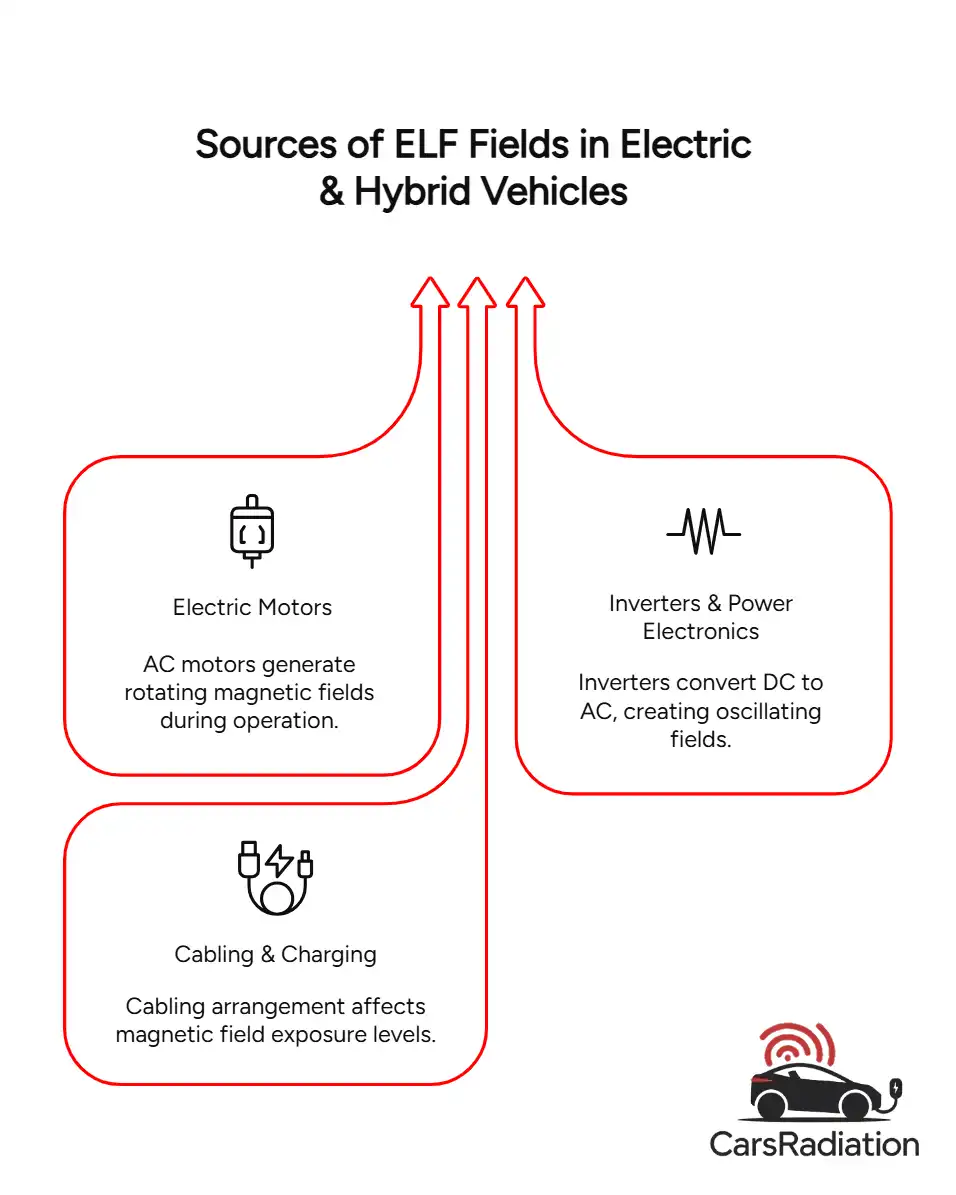Can Magnetic Fields from Electric and Hybrid Cars Cause Cancer?

The shift toward electrification in transportation introduces potential concerns regarding EMF exposure and its possible health implications. Among these concerns is whether prolonged exposure to ELF magnetic fields in EVs contributes to cancer risk.
Here, we examine existing research, exposure levels, and mitigation strategies to assess the validity of these concerns.
Key Takeaways
- Magnetic fields in electric and hybrid vehicles (EVs and HEVs) belong to the extremely low-frequency (ELF) spectrum and are classified as non-ionizing radiation.
- The World Health Organization (WHO) categorizes ELF fields as “possibly carcinogenic to humans” (Group 2B) based on epidemiological studies, primarily concerning childhood leukemia.
- Long-term cumulative exposure effects remain an open research question.
Magnetic Fields in Electric and Hybrid Vehicles
 Magnetic fields in EVs and HEVs arise from high current flowing through and in-between the high power electrical components, including batteries, inverters, and electric motors.
Magnetic fields in EVs and HEVs arise from high current flowing through and in-between the high power electrical components, including batteries, inverters, and electric motors.
These fields are classified as ELF non-ionizing radiation
Key sources of ELF fields in vehicles include:
- Battery systems: High currents flowing through battery packs generate ELF magnetic fields.
- Inverters and power electronics: The process of converting direct current (DC) to alternating current (AC) introduces oscillating magnetic fields.
- Cabling and charging infrastructure: The arrangement, shielding and grounding of electrical wiring influence exposure levels.
Measurements from the report Complex Electromagnetic Issues Associated with the Use of Electric Vehicles in Urban Transportation indicate that magnetic field intensities vary by vehicle model, seating position, and operating conditions.
Do Magnetic Fields Pose a Cancer Risk?
WHO and IARC Classification of EMFs
The WHO and the International Agency for Research on Cancer (IARC) classify ELF magnetic fields as Group 2B carcinogens, indicating limited but suggestive evidence of carcinogenicity according to the ICNIRP’s Environmental Health Criteria 238 report. This classification is primarily based on epidemiological studies linking prolonged exposure to ELF magnetic fields with a 2-3 fold increase in childhood leukemia cases. No definitive causal mechanism has been established yet for other forms of cancer.
Studies on Vehicle Magnetic Fields and Cancer
1. Exposure Levels and Human Health
Scientific studies have assessed ELF magnetic field exposure inside electric and hybrid vehicles. Key findings include:
Controlled environment measurements
According to a study entitled Complex Electromagnetic Issues Associated with the Use of Electric Vehicles in Urban Transportation, field intensities within vehicles range from 0.2 to 30 microteslas (µT), with values depending on seat position and proximity to powertrain components.
Long-term exposure implications
While short-term exposure remains largely within ICNIRP safety guidelines, cumulative exposure effects remain a concern, since magnetic field levels in electrified cars exceed the levels viewed as potentially cancerogenic to humans.
2. Epidemiological Evidence
Childhood Leukemia
Research from the BioInitative Report suggests an association between ELF exposure levels exceeding 0.3–0.4 µT and an increased risk of childhood leukemia, though the magnitude of risk remains small.
Adult Cancers
Studies on ELF exposure and risks of adult cancers, including brain and breast cancer, remain inconclusive.
3. Biological Mechanisms
Induced currents in biological tissues
ELF fields generate weak electric currents in the human body, which can potentially interfere with cellular processes such as gene expression and DNA repair.
Cumulative biological effects
Animal studies based from the biological experimental study on cumulative effect of vehicle electromagnetic radiation indicate possible biological changes under prolonged ELF exposure, but human applicability is yet to be determined.
Regulations and Mitigation Strategies
Existing Safety Standards
- ICNIRP Exposure Guidelines: The International Commission on Non-Ionizing Radiation Protection (ICNIRP) has set exposure limits designed to prevent acute effects such as nerve stimulation rather than long-term cancer risks.
- Automotive Industry Measures: Car manufacturers implement shielding techniques to reduce EMF exposure, including optimized component placement and protective enclosures.
Innovative Solutions to Reduce Exposure
Efforts to mitigate ELF exposure in vehicles include:
- Enhanced shielding in electrical wiring to minimize emissions.
- Battery positioning optimizations to reduce exposure in occupant areas.
- Active magnetic field cancellation technologies, such as SafeFields, which generate counteracting fields to neutralize ELF emissions.
Public Perception and Consumer Choices
Concerns regarding EMF exposure have influenced consumer decision-making, with some individuals favoring internal combustion engine (ICE) vehicles over EVs and hybrids due to perceived health risks. However, a gap remains between public concerns and scientifically validated risk assessments.
For those seeking to minimize exposure, precautionary steps include:
- Increasing distance from key emission sources, such as the motor and battery pack, which may reduce exposure levels.
- Evaluating vehicle-specific EMF shielding, as some manufacturers prioritize lower exposure designs.
- Considering third-party solutions, such as SafeFields, which actively neutralizes ELF magnetic fields.
Should You Be Concerned?
The relationship between ELF exposure and cancer remains an area of active research. While current epidemiological data suggests a possible association with childhood leukemia, evidence remains insufficient for a definitive causal link.
Industry regulations and shielding technologies continue to evolve, with a purpose of ensuring that in the future the exposure levels will remain within established safety guidelines. Continued monitoring and research are necessary to refine our understanding of potential long-term health risks associated with ELF fields in vehicles.

References
- ScienceDirect – Do non-ionizing radiation concerns affect people’s choice between hybrid and traditional cars?
- National Library of Medicine – Complex Electromagnetic Issues Associated with the Use of Electric Vehicles in Urban Transportation
- International Commission on Non-Ionizing Radiation Protection (ICNIRP) – Environmental Health Criteria 238
- Magility – Electromagnetic fields in cars – An Experiment
- BioInitiative 2012 – BioInitative Report

